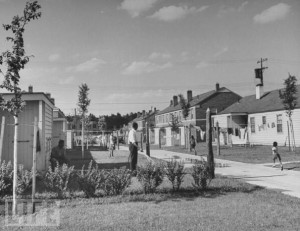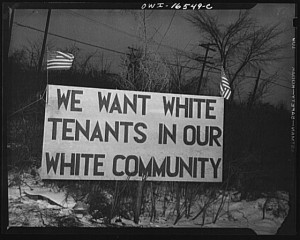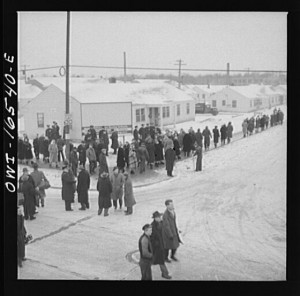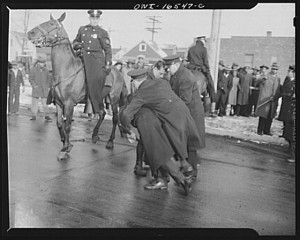In my last post, I mentioned that I’d be covering 1940s Detroit next. Specifically, I want to focus on the battle around a housing complex in Detroit.
The Sojourner Truth Homes still exist today. They are public housing, but were built before the stigma of public housing became the norm in the US. They were actually built during a time when even the white public didn’t have a problem demanding that the government do something about housing.
And during WW2, housing in Detroit was a problem. The problems of overcrowding caused by the Great Migration mixed with a desperate need for labor by industry. This was also a time of economic restructuring of the labor market due to the ending of slavery. The Great Migration was the largest movement of people in the US in history–but it was *also* the largest movement of *labor* as well. The US was investing in heavy industry. Which is why you find the fingers industry recruiters all over the Great Migration.
Housing was such a desperate situation that houses and apartments were slung up where ever space could be found, and regardless of any cohesive sense of urban planning. Multiple families were living in single houses, outrageous rent was being charged for the most squalid of conditions. The corporations had a hand in the situation as well, constructing massive dorms and family housing for workers–and of course, charging them for it too.
Oh, and housing was segregated as well. Which meant that not only was housing difficult to find period, but it also meant that people were restricted to finding or building housing in certain areas. The massive dorms built by the corporations hiring the laborers were segregated by gender as well as race.
So it’s in this context that the Sojourner Truth Homes sprung up. The homes were built in response to the demand for housing, but even so, they did not escape the heat of white supremacist heteropatriarchy. First, nobody could figure out where to put the homes. Because of segregation, black folks were confined to a few neighborhoods across Detroit, and those neighborhoods were already bursting at the seems. But no white neighborhood wanted the homes near theirs. This is the very little known or covered fact of Detroit: there were more riots in Detroit than the ones in ’67. And in the 40s, a vast majority of the riots were started and exacerbated by whites. Specifically, whites that were angry about the desegregation efforts of the black community.
After the housing commission finally decided on a place for the homes (which was close to other black communities, but closer to the white communities in the area), whites protested so vociferously (in part due to the FHA announcing that they would not back mortgages of houses near the homes if the homes were occupied by black people), the housing commission decided the homes were actually for white people. Then the black community protested along with housing rights folks, and it was decided they’d be for black people again. This went back and forth until finally it was officially decided; these homes are for black people. The housing commission set the move in date and began collecting rent from families before they had even moved in.

The day of the move in arrived–and white protestors surrounded the homes and started to riot. There were multiple injuries that day, and over 200 people arrested. And that is correct–only three of those people who were arrested were white. The move in date of the families had to be put off until April, and it was only under the supervision of over a thousand local and state police officers and 1600 National Guard that six families were finally moved in. 
So why does any of this matter? Well, if capitalism is a system of distribution that normalizes the idea that some have more resources than others (i.e. it’s an unequal distribution system)–then white supremacist heteropatriarchal nationalism is the method that capitalism uses to *enforce* that unequal distribution system. In other words: white supremacy makes it seem normal and natural that white people have access to the most and the best resources. Heteropatriarchy makes it seem normal and natural that straight men control access to the resources. Nationalism makes it seem normal and natural that the US control the rest of the world’s resources.
So if Detroit is the “Arsenal of Democracy” and where the gathering and production of massive amounts capital for very few (i.e. capitalism) centers itself, then Detroit is the geographical location where capitalism must be enforced. And the Sorjourner Truth Homes are where this enforcement is most visible.
The questions that are important to think about right now:
* Did the government really have any interest in desegregation? If it did, why did it make things worse by announcing repeatedly that it would not fund mortgages for homes near black communities? To the point that white community members in some areas even put up a wall to hide the black community near them? And why were they then rewarded for that wall by the government agreeing to fund their mortgages post-wall?
* Did the corporations bringing workers in have any accountability to the cities they were growing? Specifically, did they feel any obligation at all to follow urban planning principles or city policies designed to protect community infrastructure? Was there incentive for them to do so? What did their influence/control of city governments have to do with how the housing crisis played out?
* If neither a corporation or a local government is accountable to the land or the community they are ruling over–what effect does that lack of accountability have on the community? What effect does it have on the community’s future?
* What role did the housing crisis and segregation of not only the black community, but women, and families as well, have to do with the workers efforts to unionize? What did the corporations supporting desegregated housing have to do with stopping efforts to unionize and decreasing labor demands?
* In what ways does the seemingly “unnaturalness” of desegregation (specifically of race, but also of gender) *increase* the “naturalness” of white, straight, cisgendered, US citizen men owning and controlling all the resources?
Thinking through these questions really help you to swallow the red pill more easily. You start to see things like:
* having a static two gender system not only keeps white babies a comin’, but also keeps a gender based network of jobs where it is normal to not get paid. Either men or women can do the jobs–but the jobs themselves are gendered female, and as such, it is normal to not expect payment (or very little payment) for those jobs. ie. housework, child rearing, secretarial work, etc. Or: a static two gender system acts as an effective method to control who has access to resources and the idea that some jobs are worth more than others.
* demanding heterosexuality: creating the idea of a “traditional nuclear family” (i.e. a man, a woman, children) with a man at the head of the house because he earns the money, creates something for men to “protect.” It becomes normal and natural to expect men to “protect,” unstated: what is theirs. It is how acts like starting riots when black families move in up the street can actually stem from a place of love. They are protecting their families–by enforcing white supremacy *through* heteropatriarchal violence. But they are also protecting their families because they love them. Something to think about in context of today’s seemingly inexplicable working class white membership of the Tea Party.
* all that negative press you’ve heard about the cities up and down the I-75 corridor *especially since they’ve shifted from largely white cities to largely black cities* may actually have more to do with the need to justify NAFTA, CAFTA, the Peruvian Trade Agreement etc than it does with black people being fundamentally unable to govern themselves (as it is argued). Specifically: as corporations move out of areas that they never had any accountability to to begin with–they need reasons to *justify* that move to the white middle class that has enough resources to continue buying their goods–but may not out of anger at the move. They need it to make “practical” and “natural” sense to move towards cities with fewer regulations and less overhead. White supremacy is “natural” way to make that happen. White supremacy is so normal and ‘natural’ as to be invisible.
As such, things like white flight and the vestiges of slavery, Jim Crow, and segregation are not noticed. Things like white people rioting repeatedly throughout the years to maintain segregation are not noticed. Neither are things like resources being poured into fixing the destruction of white rioters and not black rioters or the unnatural relationship between corporations and local governments and how that relationship devastated and literally murdered white and black people alike. None of it is noticed.
White supremacy is best at making black bodies and communities hyper visible–and as such, it is *black* violence that we see in the papers. It is *black* city governments fucking everything to hell that we see. It is *black* women having babies and *black* riots and *black* segregation (i.e. when white people are in the minority) that we see.
And it makes sense then, that we all think to ourselves, well damn. It sucks, but it makes sense that all the corporations are leaving. I’d like them to stick around, but in the face of *that*–what are they supposed to do?
Rather than: in light of all *the corporations* crap, what are *we* supposed to do?
Ok. So that’s it for another “short” history lesson. Now that I’ve got all the major themes set, I’m going to start getting into some of the stuff we discussed in the intro post! First up: Decay Porn!